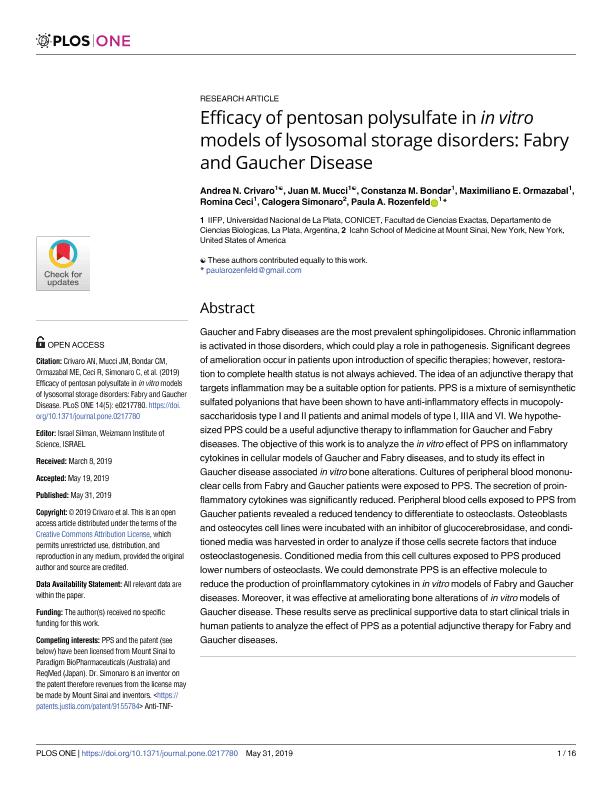Artículo
Efficacy of pentosan polysulfate in in vitro models of lysosomal storage disorders: Fabry and Gaucher Disease
Crivaro, Andrea Natalia ; Mucci, Juan Marcos
; Mucci, Juan Marcos ; Bondar, Constanza María
; Bondar, Constanza María ; Ormazabal, Maximiliano Emanuel
; Ormazabal, Maximiliano Emanuel ; Ceci, Romina; Simonaro, Calogera; Rozenfeld, Paula Adriana
; Ceci, Romina; Simonaro, Calogera; Rozenfeld, Paula Adriana
 ; Mucci, Juan Marcos
; Mucci, Juan Marcos ; Bondar, Constanza María
; Bondar, Constanza María ; Ormazabal, Maximiliano Emanuel
; Ormazabal, Maximiliano Emanuel ; Ceci, Romina; Simonaro, Calogera; Rozenfeld, Paula Adriana
; Ceci, Romina; Simonaro, Calogera; Rozenfeld, Paula Adriana
Fecha de publicación:
31/05/2019
Editorial:
Public Library of Science
Revista:
Plos One
ISSN:
1932-6203
Idioma:
Inglés
Tipo de recurso:
Artículo publicado
Clasificación temática:
Resumen
Gaucher and Fabry diseases are the most prevalent sphingolipidoses. Chronic inflammation is activated in those disorders, which could play a role in pathogenesis. Significant degrees of amelioration occur in patients upon introduction of specific therapies; however, restoration to complete health status is not always achieved. The idea of an adjunctive therapy that targets inflammation may be a suitable option for patients. PPS is a mixture of semisynthetic sulfated polyanions that have been shown to have anti-inflammatory effects in mucopolysaccharidosis type I and II patients and animal models of type I, IIIA and VI. We hypothesized PPS could be a useful adjunctive therapy to inflammation for Gaucher and Fabry diseases. The objective of this work is to analyze the in vitro effect of PPS on inflammatory cytokines in cellular models of Gaucher and Fabry diseases, and to study its effect in Gaucher disease associated in vitro bone alterations. Cultures of peripheral blood mononuclear cells from Fabry and Gaucher patients were exposed to PPS. The secretion of proinflammatory cytokines was significantly reduced. Peripheral blood cells exposed to PPS from Gaucher patients revealed a reduced tendency to differentiate to osteoclasts. Osteoblasts and osteocytes cell lines were incubated with an inhibitor of glucocerebrosidase, and conditioned media was harvested in order to analyze if those cells secrete factors that induce osteoclastogenesis. Conditioned media from this cell cultures exposed to PPS produced lower numbers of osteoclasts. We could demonstrate PPS is an effective molecule to reduce the production of proinflammatory cytokines in in vitro models of Fabry and Gaucher diseases. Moreover, it was effective at ameliorating bone alterations of in vitro models of Gaucher disease. These results serve as preclinical supportive data to start clinical trials in human patients to analyze the effect of PPS as a potential adjunctive therapy for Fabry and Gaucher diseases.
Archivos asociados
Licencia
Identificadores
Colecciones
Articulos(IIFP)
Articulos de INST. DE ESTUDIOS INMUNOLOGICOS Y FISIOPATOLOGICOS
Articulos de INST. DE ESTUDIOS INMUNOLOGICOS Y FISIOPATOLOGICOS
Citación
Crivaro, Andrea Natalia; Mucci, Juan Marcos; Bondar, Constanza María; Ormazabal, Maximiliano Emanuel; Ceci, Romina; et al.; Efficacy of pentosan polysulfate in in vitro models of lysosomal storage disorders: Fabry and Gaucher Disease; Public Library of Science; Plos One; 14; 5; 31-5-2019; 1-16
Compartir
Altmétricas



